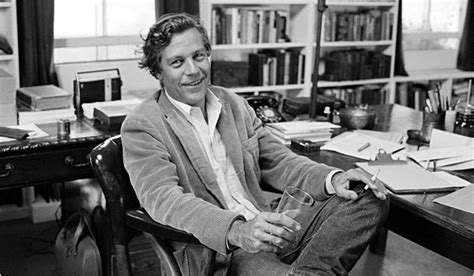A Quote by Gao Xingjian
If, while observing the boundless universe, the writer is able to scrutinise his own self as well as others, the resulting incisiveness of his observations will far surpass objective descriptions of reality.
Related Quotes
The result of observing only the universe is anxiety. Only observing the Observer of the universe will put a stop to a man's worrying and fussing and scheming. When his interest is diverted inwards he naturally relaxes his hold - his stranglehold - on the outer world. Having withdrawn his capital and paid it into his own Central Bank (where it appreciates to infinity), he has nothing to lose out there and no reason for interfering. He knows how to let things be and work out in their own time. He's in no hurry. Knowing the Self, he can hardly fail to trust its products.
The man who works recognizes his own product in the world that has actually been transformed by his work. He recognizes himself in it, he sees his own human reality in it he discovers and reveals to others the objective reality of his humanity of the originally abstract and purely subjective idea he has of himself
There's an all-enveloping destructiveness in Donald Trump's character and in his psychological tendencies. But I've focused on what professionally I call solipsistic reality. Solipsistic reality means that the only reality he's capable of embracing has to do with his own self and the perception by and protection of his own self. And for a president to be so bound in this isolated solipsistic reality could not be more dangerous for the country and for the world. He's not psychotic, but I think ultimately this solipsistic reality will be the source of his removal from the presidency.
No true Latter-Day Saint, while physically or emotionally able will voluntarily shift the burden of his own or his family's well-being to someone else. So long as he can, under the inspiration of the Lord and with his own labors, he will supply himself and his family with the spiritual and temporal necessities of life.
The greater the scientist, the more he is impressed with his ignorance of reality, and the more he realizes that his laws and labels, descriptions and definitions, are the products of his own thought. They help him to use the world for purposes of his own devising rather than understand and explain it.
No man, however enslaved to his appetites, or hurried by his passions, can, while he preserves his intellects unimpaired, please himself with promoting the corruption of others. He whose merit has enlarged his influence would surely wish to exert it for the benefit of mankind. Yet such will be the effect of his reputation, while he suffers himself to indulge in any favourite fault, that they who have no hope to reach his excellence will catch at his failings, and his virtues will be cited to justify the copiers of his vices.
Many Christians still at bottom look upon God as one of the most selfish, self-absorbed Beings in the universe, far more selfish than they could think it right to be themselves, -intent only upon His own honor and glory, looking out continually that His own rights are never trampled on; and so absorbed in thoughts of Himself and of His own righteousness, as to have no love or pity to spare for the poor sinners who have offended Him.
Emulation has been termed a spur to virtue, and assumes to be a spur of gold. But it is a spur composed of baser materials, and if tried in the furnace will be found to want that fixedness which is the characteristic of gold. He that pursues virtue, only to surpass others, is not far from wishing others less forward than himself; and he that rejoices too much at his own perfections will be too little grieved at the defects of other men.
Man—every man—is an end in himself, not a means to the ends of others; he must live for his own sake, neither sacrificing himself to others nor sacrificing others to himself; he must work for his rational self-interest, with the achievement of his own happiness as the highest moral purpose of his life.
To the enlightened man... whose consciousness embraces the universe, to him the universe becomes his 'body', while the physical body becomes the manifestation of the universal mind. His inner vision an expression of the highest reality, and his speech an expression of eternal truth and mantric power.
Writing itself, if not misunderstood and abused, becomes a way of empowering the writing self. It converts anger and disappointment into deliberate and durable aggression, the writer's main source of energy. It converts sorrow and self-pity into empathy, the writer's main means of relating to otherness. Similarly, his wounded innocence turns into irony, his silliness into wit, his guilt into judgment, his oddness into originality, his perverseness into his stinger.







































